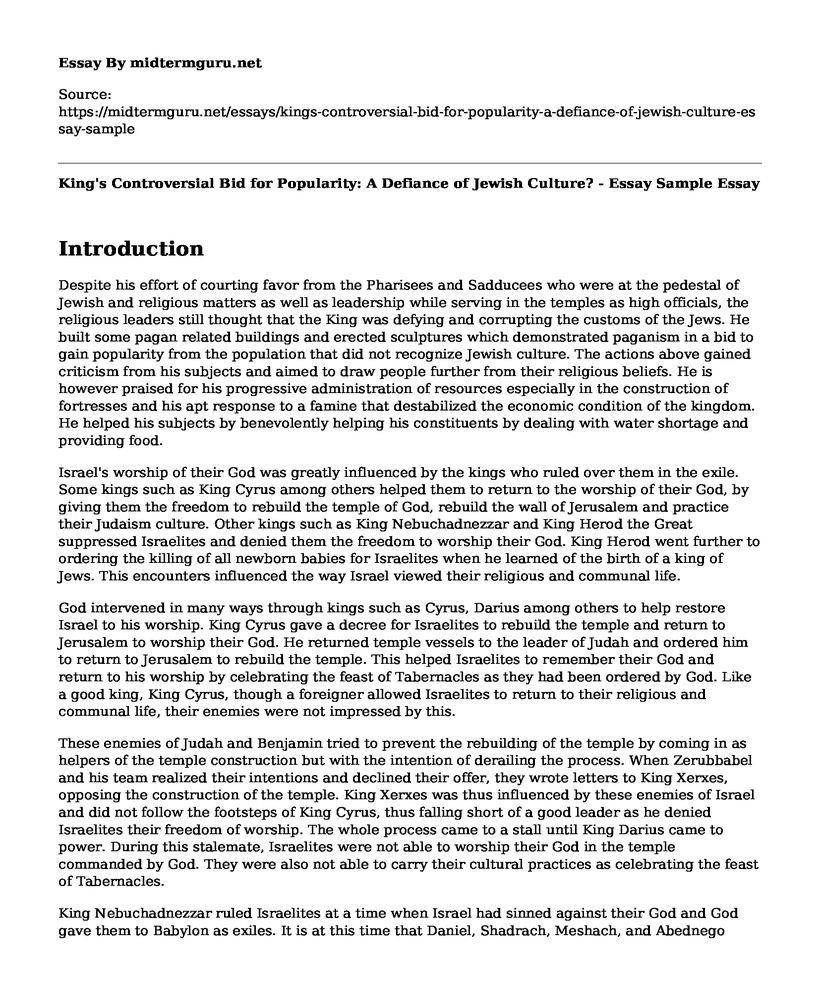Introduction
Despite his effort of courting favor from the Pharisees and Sadducees who were at the pedestal of Jewish and religious matters as well as leadership while serving in the temples as high officials, the religious leaders still thought that the King was defying and corrupting the customs of the Jews. He built some pagan related buildings and erected sculptures which demonstrated paganism in a bid to gain popularity from the population that did not recognize Jewish culture. The actions above gained criticism from his subjects and aimed to draw people further from their religious beliefs. He is however praised for his progressive administration of resources especially in the construction of fortresses and his apt response to a famine that destabilized the economic condition of the kingdom. He helped his subjects by benevolently helping his constituents by dealing with water shortage and providing food.
Israel's worship of their God was greatly influenced by the kings who ruled over them in the exile. Some kings such as King Cyrus among others helped them to return to the worship of their God, by giving them the freedom to rebuild the temple of God, rebuild the wall of Jerusalem and practice their Judaism culture. Other kings such as King Nebuchadnezzar and King Herod the Great suppressed Israelites and denied them the freedom to worship their God. King Herod went further to ordering the killing of all newborn babies for Israelites when he learned of the birth of a king of Jews. This encounters influenced the way Israel viewed their religious and communal life.
God intervened in many ways through kings such as Cyrus, Darius among others to help restore Israel to his worship. King Cyrus gave a decree for Israelites to rebuild the temple and return to Jerusalem to worship their God. He returned temple vessels to the leader of Judah and ordered him to return to Jerusalem to rebuild the temple. This helped Israelites to remember their God and return to his worship by celebrating the feast of Tabernacles as they had been ordered by God. Like a good king, King Cyrus, though a foreigner allowed Israelites to return to their religious and communal life, their enemies were not impressed by this.
These enemies of Judah and Benjamin tried to prevent the rebuilding of the temple by coming in as helpers of the temple construction but with the intention of derailing the process. When Zerubbabel and his team realized their intentions and declined their offer, they wrote letters to King Xerxes, opposing the construction of the temple. King Xerxes was thus influenced by these enemies of Israel and did not follow the footsteps of King Cyrus, thus falling short of a good leader as he denied Israelites their freedom of worship. The whole process came to a stall until King Darius came to power. During this stalemate, Israelites were not able to worship their God in the temple commanded by God. They were also not able to carry their cultural practices as celebrating the feast of Tabernacles.
King Nebuchadnezzar ruled Israelites at a time when Israel had sinned against their God and God gave them to Babylon as exiles. It is at this time that Daniel, Shadrach, Meshach, and Abednego were taken to the king as young learned Israel youth and King Nebuchadnezzar wanted to induce them to Babylonian culture and brainwash them of their Judaism practices. But these young men declined to kings offer, even declining to eat special meals at the king's table but rather asked to be allowed to feed on vegetables (Daniel 1:8). God of Israel intervened and they grew healthier than the rest. They continued to pray their God and King Nebuchadnezzar, through the advice of his council ordered for all people to worship the idol god he had made but they declined. They were taken through many suffering as being thrown into the den of lions and others being thrown to fire (Daniel 3). Due to their commitment to serving their God, he intervened in every situation and they never got hurt.
As a result of this, King Nebuchadnezzar ordered that the God of Israel be worshiped in the whole of Babylon. This shaped the political and communal culture of Israelites as they were again allowed to worship and observe all the festivals of their God. When the king felt as equal to God due to the power he had, God reduced him to an animal, making him feed on grass for seven years (Daniel 4:33).
All these instances show how Israel differed more in their views to their God and how as a community, they viewed their priests and how all these affected their day to day lives. As witnessed through King Cyrus, King Darius I and Darius II, God can use those who are on his side to advance his mission for his people, even when the kings are not of Israel community. On the other hand, God through punishing those who went against him like King Nebuchadnezzar, he made his name great and more feared by Jews. Religious leaders, like Joshua, and Ezra also played a great role in returning the worship of God to his people.
References
Bible, H. (1996). The Holy Bible: King James Version. Broadman & Holman Publishers.
Cite this page
King's Controversial Bid for Popularity: A Defiance of Jewish Culture? - Essay Sample. (2023, Jan 01). Retrieved from https://midtermguru.com/essays/kings-controversial-bid-for-popularity-a-defiance-of-jewish-culture-essay-sample
If you are the original author of this essay and no longer wish to have it published on the midtermguru.com website, please click below to request its removal:
- Analysis of the Conditions Set Forth in the Treaty of Versailles
- History Essay Sample About Alexander the Great
- Paper Example on Teaching of James
- Research Paper on Culture Expectations and Identity
- Slavery in Chocolate Industry: Systemic Issues & Economic Systems - Essay Sample
- Slavery: A Dark History, Unpunished and Romanticized - Essay Sample
- Critical Essay on Cotton Mather's "The Wonders Of The Invisible World"







